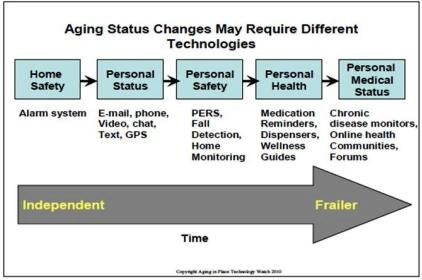For security dealers looking for new ways to diversify their offerings and increase RMR, entering the PERS market can be an exciting new challenge. “Do not be afraid to enter the market, even with no experience. People go to great lengths to provide security for their homes and businesses, so it’s a reasonable jump for security dealers to offer a device that protects an individual’s personal safety,” says Chuck Stevens, vice president, health and wellness strategic business unit, Linear LLC, Carlsbad, Calif.
Dealers planning to enter the PERS space must give it serious consideration. While many companies see growing opportunity in PERS and other health-care-related services as the baby boomers age, bringing PERS to a security business involves much more than simply adding a new product. Dealers need to educate themselves about the industry and exercise diligence in setting up their business plan. “People who do it in a casual way are probably not doing very well for the customer,” says Howard Feldman, president of Pioneer Emergency Response Services and Pioneer Security Services in San Diego, Calif. He warns dealers that with many new players entering the market, from phone companies to security dealers, the space is more competitive than it was seven or eight years ago.
Others, including Christopher Baskin, chief executive officer (CEO) of American Two-Way, located in North Hollywood, Calif., say that dealers considering entering the PERS space should do so as soon as possible to stay ahead of the competition. “They should be in the space if they are not already,” he says. “It’s a great space to be in. It is a great RMR generator and a great service for the end user,” Baskin says.
For dealers ready to take this step, SDM has gathered the top 8 areas of advice from successful dealers and manufacturers about how to get started.
1. Create a Separate PERS Division
The first thing a dealer must do is to learn about the industry.“Get an understanding of the health care industry and how it’s different from the security industry,” says David Crawford, general manager for Guardian Medical Monitoring, located in Southfield, Mich.
Once they have that solid foundation, dealers should approach PERS as a separate, but related, business endeavor. “My top advice to dealers would be to maintain separation between PERS and other business segments. Although some of the principles of safety and security apply, it’s a different customer base with different challenges that require sensitivity,” Stevens recommends.
AiN Group’s Renee Lupo, American Emergency Monitoring Association (AEMA) business development associate for the Chesterfield Township, Mich.-based organization, recommends that dealers create a company name and logo for their medical alert division that is similar to the established security company’s name but distinguishes it as a PERS provider.
2. Hire People Who Understand the Industry and the Customer
Ralph Collier, PERS product manager for EMC Security, a Suwanee, Ga.-based LogicMark dealer, recommends having at least one person completely dedicated to operating the PERS business. The PERS specialist needs to understand both seniors and the health care industry. “If they’re interested in it, they must realize that the customer is not a typical security customer.” He adds, “It’s a totally different business. They have to be prepared.”
Sales staff and operators working with seniors need to know how to communicate effectively and make seniors feel comfortable. “You never want the end user to feel like they are bothering you, or they won’t use it again,” says Baskin.
From sales to monitoring, PERS requires a more hands-on, labor-intensive approach than security alarm systems. When working with seniors, it’s all about patience and understanding, says Allen Polsky, vice president of strategic alliances, for Medical Alarm Concepts, King of Prussia, Pa. “Customer service is what we’re about,” he explains.
3. Dedicate Resources Specifically to PERS
Dealers need to invest in PERS-specific marketing and reach out through different channels than they do with traditional security. “The way to market to get to seniors and their families is different than security. We have a completely separate sales staff,” explains Crawford. “This is more of a long-term sales cycle, relationship building, marketing and education,” he says.
PERS marketing is more of a grass roots effort, notes Collier. Dealers need to get out to where the seniors are by joining senior organizations, attending senior fairs, and working with doctor’s offices, pharmacies and dialysis centers to develop referral programs from heath care providers, he shares.
“The business involves cultivating referral services to send business to you,” says Feldman. This is extremely important because the expected PERS contract life is shorter than for alarm monitoring, approximately 24 to 30 months on average.“There’s very high attrition, so you have to sell a lot to stay ahead of it,” says Crawford.
Although it may take some time, once dealers become established as PERS providers, many find the initial investment pays off. “It’s not an overnight hit, but it is a hit,” says Polsky.
4. Select a Central Station Experienced With PERS
Finding a good monitoring partner is essential. Because the response to a PERS call is different, requiring specialized training, more time with caller, and more staffing, dealers should seek out a central station that has plenty of experience with PERS. “It is important that the dealer is comfortable with his choice of response center. After all, the response center is representing his company,” says Stevens.
Drew Bell, chief marketing officer of SafetyCare Technologies, Reading, Pa. agrees, “The biggest thing security dealers should look for in a central station is the training there dispatchers have.” They need to be patient, friendly, and kind, and be able to work effectively with individuals in crisis. “They need responders who take control of the situation and calm the person down,” Bell adds.
(See "Selecting a Monitoring Station" sidebar for more information)
5. Seek Counsel
Because of the limited amount of time that PERS is used by a senior, customers don’t want long-term contracts, Collier says. Many PERS providers offer their monitoring services on a month-to-month basis. Regardless of the length of service, a well-written and executed contract is critical. “Go to an experienced industry attorney,” Feldman says. When it comes to contracts and insurance, he advises, “Hire people that know more about the business than you do.”
The nature of the PERS exposure differs significantly from the nature of a burglar and fire alarm system in that, while a burglar alarm system is designed protect against property losses, PERS is designed to alert others to medical emergencies. Dealers offering PERS need to obtain specific insurance coverage and use a subscriber contract that is specific to medical emergencies. Many states have different requirements as to exactly what must be included in the subscriber contract. “Anyone getting into the PERS business is strongly encouraged to consult with an attorney who knows and understands the requirements in the state(s) you are conducting your business in,” says Rick Gombar, president of Rick Gombar Insurance Services, located in Los Angeles, Calif., cautioning dealers to be diligent in creating a good, solid contracts and to pay attention to the details.
Even with a comprehensive contract in hand, dealers must exercise care in executing them. Gombar points out one common mistake dealers should avoid. With PERS, the purchaser signing the contract is often not the end user, but a child or other relative of the senior. Regardless of who purchased the system, the end user must sign the contract. The contract does not protect the dealer if the user did not sign it, he warns. Ideally, both the end user and purchaser should sign it. If the end user is unable to sign, a person legally designated to have power of attorney can do so.
6. Get Covered
A good contract is only part of the picture. Because of the greater liability, the dealer needs to obtain the appropriate insurance coverage for PERS services.
Liability is an even greater concern in PERS than with standard alarm systems, “You’re talking about someone’s life, not just property loss,” Feldman says. “The potential exposure is much larger.”
Having sufficient insurance coverage to protect the dealer is critical. Start by finding a good insurance carrier who understands issues specific to the PERS industry. “There’s only a handful of carriers in the country will even entertain insuring PERS. Some carriers specifically exclude that exposure,” Gombar says. Dealers can ask their current insurance carrier if they offer this type of coverage.
In selecting a policy, PERS dealers must obtain both general liability and errors and omissions insurance. He recommends that dealers ask the agent to specifically point out the endorsement that covers PERS. As for policy limits, Gombar says typical limits on a general liability insurance policy covering alarm operators is $1 million per occurrence with a $2 million aggregate, which is also common for policies covering PERS. However, the deductible can range from zero up to $10,000 depending on the insurance carrier.
7. Choose a Device
Dealers need to consider a wide range of factors when selecting a device and manufacturer to work with. “They should look for a product and vendor that they are comfortable working with. Is there anything unique about the product that they will use that may allow them to charge a higher monthly fee? Is the product user friendly, and will seniors feel comfortable using it? If they are using a product with two-way voice, are they satisfied with the quality of the voice communication and the range that they get?” shares Kevin O’Connor, president, of LogicMark, based in Louisville, Ky.
With a variety of PERS devices on the market, selecting a product and manufacturer can be a challenge. “It’s hard to find something that does everything, so pick who your target market will be,” Collier says. Because each device has its pros and cons, he suggests carrying more than one product in order to meet different customer needs. (See "Selecting a Device" sidebar for more information)
8. Ask for Help
With all the new information they need to learn about the industry, dealers may feel overwhelmed at first. Reaching out to those already in the PERS space, as well as manufacturers, can help dealers learn about the business and find additional resources. Professional organizations can also help. “Join an industry group, such as MAMA [Medical Alert Monitoring Association], to accelerate the learning curve,” Feldman advises.
Ultimately, dealers who do their homework and commit to the business will be most successful. Those who are diligent in their approach will find that PERS has benefits beyond the bottom line. “It’s a great industry to be in if you care about people, and you care about RMR. It’s a win-win. You’re providing a terrific service,” Polsky says.
MORE ONLINE:
Check out these articles for additional SDM coverage of PERS, monitoring, and related topics:
- PERS on the Move
- Aging in Place: PERS and Beyond
- PERS: A Science and an Art
- Telguard Extends into the Cellular PERS Market With Licensing Agreement
Selecting a Device
When selecting a PERS device and manufacturer, dealers need to consider a variety of factors.
Waterproofing: Many falls happen in bathrooms, so seniors should have devices that can be taken into the shower or bath. If users remove the devices before bathing, they may not have them when needed, or they may forget to put them on again later.
Range: Generally the greater the range, the better. This is especially true for active seniors who spend time outside or for those who live in larger homes.
Voice communication: Direct two-way voice communication with the central station operator (as opposed to a return call) is essential. Devices that offer two-way voice through pendant allow for better communication if the senior is not near the PERS base unit.
Connection: Be sure to understand if and how the device works over different types of phone connections, such as plain old telephone service (POTS), VoIP, and cellular to meet the needs of different customers and anticipate future changes in phone service.
Battery life of transmitter: The more time the device spends charging, the less time it is protecting the user.
Device size and ease of use: If the device is heavy, awkward or difficult to use, seniors will be less likely to use it.
Style: PERS devices are available in pendant, wristband and pocket versions.
Additional features: Some manufacturers offer additional features, such as fall detection.
Support: Be sure to research and understand the manufacturer’s service, repair and replacement policies.
PERS Financing on the Horizon
In the past few years, PERS contracts have reached an average longevity of about 30 months, and financial providers have begun to take an interest in the industry, says Tony Smith, CEO, Security Funding Associates, in Tujunga, Calif. He expects financing options for PERS to become available through industry-specific providers later this year or in early 2014. “PERS is an excellent opportunity for alarm dealers to expand RMR by adding a medical component to the life safety and property coverage they are doing now,” Smith says.
For security dealers interested in getting into the PERS space, he explains, the financial side of PERS can be different than what they are accustomed to, “It does not involve a lot of capital to get involved, but the numbers are different from security,” Smith explains.
Among other things, monitoring costs are higher and contract life is shorter.
The difference in the numbers will be reflected in the financing available. Smith anticipates the advance rate for PERS will be a lower multiple than for alarms, somewhere around 6 to 8, as compared with 17 to 25 for alarms. “Volume will be key to success. Without volume, you won’t get the cash flows you need to be successful,” he cautions. “Dealers should look at developing several thousand accounts to make it worthwhile financially. Without a specific marketing plan for PERS, you’re not going to get that many accounts,” he adds.
Many companies take advantage of the plug-and-play capability of most available PERS equipment to ship the box directly to the customer and let him or her install it. This helps build volume, but minimizes the importance of customer relationships. To mitigate that issue, companies can deploy sales staff and installers to establish those relationships with the users and promote longevity.
Selecting a Monitoring Station
Selecting the right monitoring partner is paramount in becoming a successful PERS provider. Christopher Baskin, CEO of American Two-Way, suggests that dealers looking for a monitoring partner find a center that has extensive experience with PERS.
He suggests asking the following questions:
- How long has the monitoring center been doing PERS?
- Do they provide true two-way voice communication? In other words, when the PERS alarm is activated, is the user able to immediately speak with a center operator, and not wait for the center to call the user back?
- Does the operator stay on the line with the senior until help arrives?
- Does the monitoring center staff know how to work with seniors?






